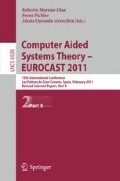Abstract
This paper represents the research direction which deals with various computer aided energy converters, in particular thermal or chemical engines and fuel cells. Applying this general framework we can derive formulae for a family of converters’ efficiencies and apply them to estimate irreversible power limits in practical systems. Thermal engines can be analyzed as linear units and radiation engines may be treated as Stefan-Boltzmann systems. We can also consider power limits for thermal systems as those propelled by differences of temperatures and chemical ones as those driven by differences of chemical potentials. In this paper we focus on fuel cells which are the electrochemical energy generators. We show that fuel cells satisfy the same modeling principles and apply similar computer schemes as thermal machines.
Access this chapter
Tax calculation will be finalised at checkout
Purchases are for personal use only
Preview
Unable to display preview. Download preview PDF.
References
Sieniutycz, S.: A synthesis of thermodynamic models unifying traditional and work-driven operations with heat and mass exchange. Open Sys. & Information Dynamics 10, 31–49 (2003)
Curzon, F.L., Ahlborn, B.: Efficiency of Carnot engine at maximum power output. American J. Phys. 43, 22–24 (1975)
De Vos, A.: Endoreversible Thermodynamics of Solar Energy Conversion, pp. 30–41. Oxford University Press, Oxford (1994)
Sieniutycz, S., Kuran, P.: Nonlinear models for mechanical energy production in imperfect generators driven by thermal or solar energy. Intern. J. Heat Mass Transfer 48, 719–730 (2005)
Sieniutycz, S., Kuran, P.: Modeling thermal behavior and work flux in finite-rate systems with radiation. Intern. J. Heat and Mass Transfer 49, 3264–3283 (2006)
Sieniutycz, S.: Dynamic programming and Lagrange multipliers for active relaxation of resources in non-equilibrium systems. Applied Mathematical Modeling 33, 1457–1478 (2009)
Kuran, P.: Nonlinear models of production of mechanical energy in non-ideal generators driven by thermal or solar energy, PhD Thesis, Warsaw University of Technology (2006)
Sieniutycz, S., Jeżowski, J.: Energy Optimization in Process Systems. Elsevier, Oxford (2009)
Sieniutycz, S.: An analysis of power and entropy generation in a chemical engine. Intern. J. of Heat and Mass Transfer 51, 5859–5871 (2008)
Tsirlin, A.M., Kazakov, V., Mironova, V.A., Amelkin, S.A.: Finite-time thermodynamics: conditions of minimal dissipation for thermodynamic process. Physical Review E 58, 215–223 (1998)
Sieniutycz, S.: Complex chemical systems with power production driven by mass transfer Intern. J. of Heat and Mass Transfer 52, 2453–2465 (2009)
Zhao, Y., Ou, C., Chen, J.: A new analytical approach to model and evaluate the performance of a class of irreversible fuel cells. International Journal of Hydrogen Energy 33, 4161–4170 (2008)
Wierzbicki, M.: Optimization of SOFC based energy system using Aspen PlusTM, MsD thesis, Warszawa, Supervised by S. Sieniutycz (Faculty of Chemical and Process Engineering, Warsaw University of Technology) and J. Jewulski (Laboratory of Fuel Cells, Institute of Energetics, Warsaw) (2009)
Author information
Authors and Affiliations
Editor information
Rights and permissions
Copyright information
© 2012 Springer-Verlag Berlin Heidelberg
About this paper
Cite this paper
Sieniutycz, S. (2012). Modeling and Simulation of Power Yield in Thermal, Chemical and Electrochemical Systems: Fuel Cell Case. In: Moreno-Díaz, R., Pichler, F., Quesada-Arencibia, A. (eds) Computer Aided Systems Theory – EUROCAST 2011. EUROCAST 2011. Lecture Notes in Computer Science, vol 6928. Springer, Berlin, Heidelberg. https://doi.org/10.1007/978-3-642-27579-1_76
Download citation
DOI: https://doi.org/10.1007/978-3-642-27579-1_76
Publisher Name: Springer, Berlin, Heidelberg
Print ISBN: 978-3-642-27578-4
Online ISBN: 978-3-642-27579-1
eBook Packages: Computer ScienceComputer Science (R0)

